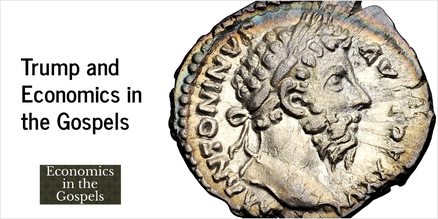 The natural inclination when trying to sum up Trump as an economic participant in the Gospels is to think along the lines of how he fits into the stories. Can you imagine him saying or doing the things mentioned, and perhaps, which participant does he most emulate. Different readers will see that very differently I suspect. Many of his followers will think he bears much in common with Jesus Himself. Others might choose Lazarus. Still others Pilate. It seems though that Herod is perhaps the best choice along these lines, as well as “The Man” in the parables, meaning the boss or master. Most of the parables have such a figure and it’s easy to see Trump in those roles. The economy we see in the Gospels, when broken down and analogized to today, seems familiar in many ways. Perhaps that is why the narrative, the stories, the people, the situations, the images seem relevant through the ages. It’s easier in some ways to notice the things that aren’t there. But what we see is that much of what we take for granted was there, albeit in more simple states: Agriculture? Check. Housing? Check. Lawyers? Of course. We’ll get to a more robust discussion of Trump and Experts in the Law later.
0 Comments
As we approach the inauguration we thought we would complete this series on Trump and Economics in the Gospels first begun in 2017. 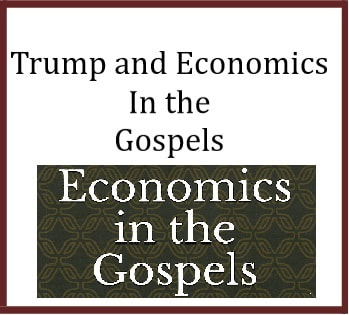 As we reach the end of this series on Trump and Economics in the Gospels we find a chapter that finds little to talk about in reference to Trump. Sure, we could talk about Ivanka and her clothing line but few ties in to Donald himself, per se. Aside from his ties perhaps being a bit too long – and there are no mentions of ties in the Gospels – his clothing is pretty standard stuff: suits, suits, suits. And golf attire. So, since no one dresses like Jesus or John the Baptist nowadays we’ll just let this chapter come straight from the original Economics in the Gospels without comment. See if you can make a tie-in. The Gospels are full of clothes, cloth, curtains, and the like. There was obviously a thriving industry in making these things and one can assume a significant percentage of the GDP of the time went into the production of all these materials.
These items are also mentioned poignantly in key episodes, stories and parables. Similarly, we see things associated with these items also mentioned, like bleach, patches, launderers, etc. We also see the entire range of finery from the mention of John Baptist’s camel hair outfit to the most elegant and fancy of attire. We also see how textiles were used to prepare the dead – and wrap new born babies. As we approach the inauguration we thought we would complete this series on Trump and Economics in the Gospels first begun in 2017. To bring this, and other intriguing connections to the consumerist world in which we live, and which Trump, and his family (particularly Ivanka), take advantage of as entrepreneur, included in this instalment are more links than usual to make the connections. Trump is an industry to himself with a seemingly endless array of products marketed with his image and imprimatur, and presumably, a royalty. What’s more basic to economics than that? Amazon.com : trump merchandise The Gospels include mention of a significant number of goods produced in what one might term the light-manufacturing of its day. Items include nails, swords, tables, lamps, etc. One could argue that this list of products are a good start on a list of essential items a society needs to function. When added to the services/labor listed previously, and the construction activity evidenced as well, a picture of the Gospel economy emerges. From steaks to golf gear, to Christmas ornaments and masks, the list goes on and on. Not to mention daughter Ivanka’s offerings or the merchandise sold at his properties, this list is virtually unlimited. And let’s not forget those MAGA hats. Frustratingly perhaps for free-marketers, Jesus seemed rarely to be a friend of the marketplace. Mark 11:16 and he would not permit anyone to carry merchandise through the temple courts. For the full text click here.
As we approach the inauguration we thought we would complete this series on Trump and Economics in the Gospels first begun in 2017. 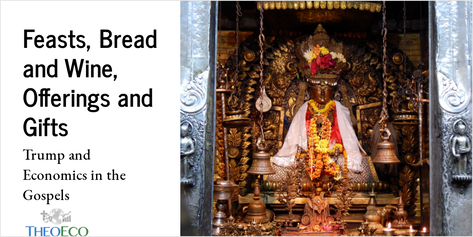 At Christmas time 2020 we are in a time of feasting at Christmas though COVID-19 has made this one different than most. Feasts are hard to come by for many as food lines are ever present in the news throughout the USA, and throughout the world for many. Many are short of food at this, the time when feasts are usually had by most and loved ones gather. The traditional feasting one would expect at the White House this time of year is non-existent though we are assured that Mar-a-Lago is offering feasting options. https://www.maralagoclub.com/dining. In the time of the Gospels, as today, there was apparently a lot of big eating going on. Feasts are some of the most commonly referenced activities, from the wedding where Jesus turned water into wine to the Last Supper. Putting aside Trump’s most infamous feast, the fast food banquet for the Clemson Tigers, we find an intriguing analogy to Trump in Pontius Pilate’s pardon of one prisoner at the time of the Passover feasting. Of course, when Trump is pardoning so many one prisoner seems quaint. Matthew 27:15 During the feast the governor was accustomed to release one prisoner to the crowd, whomever they wanted. As we continue with the pardon theme we find an intriguing intersection with this segment of the study when Trump pardons two turkeys: Bread and Butter, Trump pardons two turkeys: Bread and Butter - BBC News. Bread and Wine hold especially significant importance in the Gospels as the preeminent food and drink, and given their preponderance their production presumably accounted for significant portions of the economic output of the time. Of course, this is no real surprise to most Christians as the two foods are sacred and discussed over and over again in churches throughout the world as the body and blood of Jesus – capable of saving souls and an everlasting gift to God’s people. Trump, when a Presbyterian (He is reportedly now a "nondenominational Christian.") is quoted as saying: "We I take, when we go, and church and when I drink my little wine -- which is about the only wine I drink -- and have my little cracker, I guess that's a form of asking for forgiveness, and I do that as often as possible because I feel cleansed,” https://washingtonmonthly.com/2015/07/20/trump-the-believer/ In a specific economic context, there was obviously a great deal of wine production. As mentioned previously, it must have contributed appreciably to the overall GDP of its day. We can see references to vineyards throughout the parables and mentions of vines, grapes, wineskins, winepress, etc. Intriguingly, John the Baptist is supposed to never drink the stuff: Luke 1:15 for he will be great in the sight of the Lord. He must never drink wine or strong drink, and he will be filled with the Holy Spirit, even before his birth. Trump is also famous for not drinking, aside from communion wine apparently as we saw in the aforementioned quote. Trump at this writing is either going to be seen as a Santa or a Grinch, depending upon his veto of the latest COVID relief bill. Given the trillions of new national debt one can argue that he has facilitated some of the most extreme largess in American history. Unfortunately, it is all financed with public debt engineered with modern economic tools and theory unknown in Jesus’ time. In conclusion, Trump would likely be glad about the following passage. Mark 4:25 For whoever has will be given more, but whoever does not have, even what he has will be taken from him.” For the full text click here
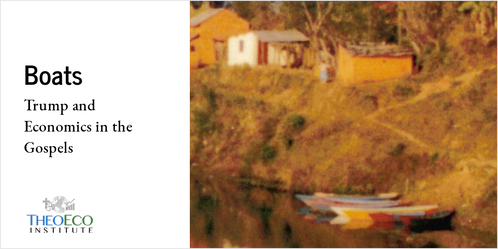 There are many references to boats in the Gospels. From those used by disciple-fishermen, to those used for transportation, boats are mentioned throughout. Mark 5:2 Just as Jesus was getting out of the boat, a man with an unclean spirit came from the tombs and met him. Mark 5:18 As he was getting into the boat the man who had been demon-possessed asked if he could go with him. Trump isn’t particularly known for his love of boats and yachts though he did buy Adnan Khashoggi’s yacht in the 1980’s and renamed it Princess Trump Princess: Inside Donald Trump’s Lavish 86 Metre Superyacht | Boat International. More recently Trump’s supporters held a boat parade in Texas where several boats got into trouble Multiple Boats Sink During 'Trump Boat Parade' On Texas Lake | HuffPost Given the paucity of Trump connections to boating we’ll use this brief chapter on boats to delve into transportation in general a bit. In fact, there are no other modes of transportation mentioned in the Gospels, at least not that Jesus or his followers used – aside from their feet, of course. Hard to imagine Trump getting around much on his feet. Long hikes and visions of Trump just don’t match up somehow. In perhaps the most famous disciple encounter, Jesus instructs Simon to catch people instead of fish. Like Simon (Peter) other disciples were fishermen. Matthew 4:21 Going on from there he saw two other brothers, James the son of Zebedee and John his brother, in a boat with Zebedee their father, mending their nets. Then he called them. 4:22 They immediately left the boat and their father and followed him. Jesus and His disciples used boats regularly, sometimes to get away from the crowds. Matthew 14:13 Now when Jesus heard this he went away from there privately in a boat to an isolated place. But when the crowd heard about it, they followed him on foot from the towns. Walking on water without the boat? Quelling the sea from dry land? These are major miracle stories which would be difficult to imagine without the boat. Sometimes, things apparently got too crowded on shore. Matthew 13:1 On that day after Jesus went out of the house, he sat by the lake. 13:2 And such a large crowd gathered around him that he got into a boat to sit while the whole crowd stood on the shore. Traveling by boat seems to have been a preferred method of travel. Not so much by Trump it would seem. Peter walked on water as well, from a boat. Matthew 14:29 So he said, “Come.” Peter got out of the boat, walked on the water, and came toward Jesus. Many of Trump’s supporters wouldn’t be surprised to him walking on water in this way. 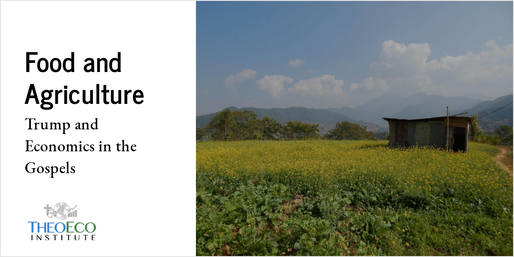 The Gospels paint a vivid picture of the agricultural segment of the economy in Jesus’ time. We see sheep, herbs, fruit, eggs, etc. The list is long. How does this apply to Trump? Trump in pop culture is associated with steaks, Kentucky Fried Chicken, food boxes, a fast food buffet for the Clemson Tigers, the list goes on. And if we look at the broader discussion of agriculture we see discussions of sowing, weeds, and other such things, particularly in the parables. Matthew 13:24 He presented them with another parable: “The kingdom of heaven is like a person who sowed good seed in his field. 13:25 But while everyone was sleeping, an enemy came and sowed weeds among the wheat and went away. 13:26 When the plants sprouted and bore grain, then the weeds also appeared. 13:27 So the slaves of the owner came and said to him, ‘Sir, didn’t you sow good seed in your field? Then where did the weeds come from?’ 13:28 He said, ‘An enemy has done this.’ So the slaves replied, ‘Do you want us to go and gather them?’ 13:29 But he said, ‘No, since in gathering the weeds you may uproot the wheat with them. 13:30 Let both grow together until the harvest. At harvest time I will tell the reapers, “First collect the weeds and tie them in bundles to be burned, but then gather the wheat into my barn.” Fish are probably the most famous foodstuff of the Gospels, after bread. Luke 24:41 And while they still could not believe it (because of their joy) and were amazed, he said to them, “Do you have anything here to eat?” 24:42 So they gave him a piece of broiled fish, Fruit is found often in the Gospels with references to what comes from a good tree, or a bad tree, an apparent analogy to good and evil. The fruit mentioned most in the Gospels is the fig. Grapes are close, especially if one counts wine and allusions to “fruit of the vine”. Mark 11:13 After noticing in the distance a fig tree with leaves, he went to see if he could find any fruit on it. When he came to it he found nothing but leaves, for it was not the season for figs. Even though we don’t see Christ eating any – it could be concluded that Jesus was a pescatarian - we find chicken, pigs, oxen, and, most notably, sheep, with Jesus the shepherd. The most vulnerable of all is the lamb, used by Jesus to refer to the disciples, and is a metaphor for Jesus with John the Baptist’s reference to Jesus as “the Lamb of God”. In this passage we see Christ referring to his disciples as lambs: Luke 10:3 Go! I am sending you out like lambs surrounded by wolves. Lambs vs wolves? This is difficult for most Christians to get their arms around as few of us like the idea of being lambs and much prefer to be a wolf, especially in today’s times as evidenced by the spike in gun sales leading up to the election. Even Walmart stopped selling guns temporarily. So, it seems valid to wonder how Trump might see himself in this scenario: Lamb or wolf? As we approach the election we thought we would complete this series on Trump and Economics in the Gospels first begun in 2017. 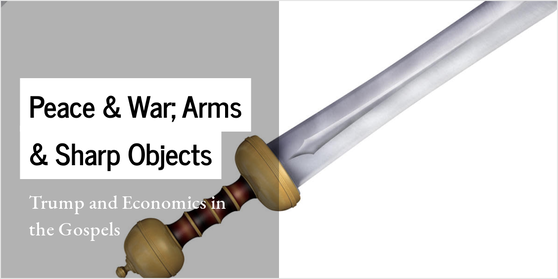 President Trump is given high marks by his supporters for keeping America out of any new wars and overseeing the defeat of Isis. He is also credited with overseeing an increase in military spending and broadening peace between Israel and the Arab world. Christ never commanded any legions though that was apparently by choice. Matthew 26:53 Or do you think that I cannot call on my Father, and that he would send me more than twelve legions of angels right now. Paradoxically the “Prince of Peace” said that He wasn’t here to bring peace at all. Can we see Trump in the following? Luke 12:51 Do you think I have come to bring peace on earth? No, I tell you, but rather division! 12:52 For from now on there will be five in one household divided, three against two and two against three. 12:53 They will be divided, father against son and son against father, mother against daughter and daughter against mother, mother-in-law against her daughter-in-law and daughter-in-law against mother-in-law.” Obviously, an arms industry was vital to the expanse and defense of the Pax Romana in Christ’s time, requiring the outfitting of armed forces throughout the empire. Not so different for the realms of today; and, as in Roman times, we find the use of shackles and chains to subdue the furious and violent. Mark 5:4 For his hands and feet had often been bound with chains and shackles, but he had torn the chains apart and broken the shackles in pieces. No one was strong enough to subdue him. Trump’s time will be stained by the use of clubs and armor to quell social unrest, swelling the Black Lives Matter movement. Mark 14:43 Right away, while Jesus was still speaking, Judas, one of the twelve, arrived. With him came a crowd armed with swords and clubs, sent by the chief priests and experts in the law and elders 14:47 One of the bystanders drew his sword and struck the high priest’s slave, cutting off his ear. 14:48 Jesus said to them, “Have you come with swords and clubs to arrest me like you would an outlaw? Christ would not only have been familiar with such scenes, but the cause of them. “Good Trouble” perhaps in the words of John Lewis, an enduring presence in society’s search for elusive peace at home in Trump’s time. As we approach the election we thought we would complete this series on Trump and Economics in the Gospels first begun in 2017. 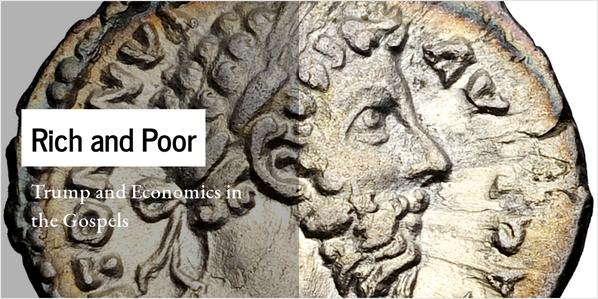 Much of what the Gospels speak to surrounds the haves, and the have-nots. References abound both in direct and indirect mentions of the disadvantages the rich will have, and the relative advantages the poor will receive. Mark 10:31 But many who are first will be last, and the last first.” Where’s Trump in these passages? Obviously, being poor is not generally associated with him. To the contrary his persona is the opposite: he is rich. One of the most famous passages of all is Jesus stating what seems the most empirically provable statement he ever uttered. No matter the economic system this holds true to today. Matthew 26:11 For you will always have the poor with you, but you will not always have me! Many times in the Gospels it is stated that the poor will receive a reward in the afterlife. As we move along in Larazus’ story we get more of what the Gospels have to say on the relative situation between rich and poor; it is not a pretty picture. Luke 16:22 “Now the poor man died and was carried by the angels to Abraham’s side. The rich man also died and was buried. 16:23 And in hell, as he was in torment, he looked up and saw Abraham far off with Lazarus at his side. 16:24 So he called out, ‘Father Abraham, have mercy on me, and send Lazarus to dip the tip of his finger in water and cool my tongue, because I am in anguish in this fire.’ 16:25 But Abraham said, ‘Child, remember that in your lifetime you received your good things and Lazarus likewise bad things, but now he is comforted here and you are in anguish. It’s not all bad for the rich. There are several instances where rich folk are seen in a good light. Matthew 27:57 Now when it was evening, there came a rich man from Arimathea, named Joseph, who was also a disciple of Jesus. 27:58 He went to Pilate and asked for the body of Jesus. Then Pilate ordered that it be given to him.. But generally, being rich is seen as a disadvantage, as in this famous passage about the camel and fitting through the eye of a needle. Mark 10:23 Then Jesus looked around and said to his disciples, “How hard it is for the rich to enter the kingdom of God!” 10:24 The disciples were astonished at these words. But again Jesus said to them, “Children, how hard it is to enter the kingdom of God! 10:25 It is easier for a camel to go through the eye of a needle than for a rich person to enter the kingdom of God.” 10:26 They were even more astonished and said to one another, “Then who can be saved?” 10:27 Jesus looked at them and replied, “This is impossible for mere humans, but not for God; all things are possible for God.” And this in Luke… Luke 6:24 “But woe to you who are rich, for you have received your comfort already. Inheritance is one of the predominant themes throughout the entire Bible, and the Gospels are no exception. One might wonder from the following famous passage what the non-meek will inherit. Matthew 5:5 “Blessed are the meek, for they will inherit the earth. Of course, Trump is famous for an inheritance of a different kind. 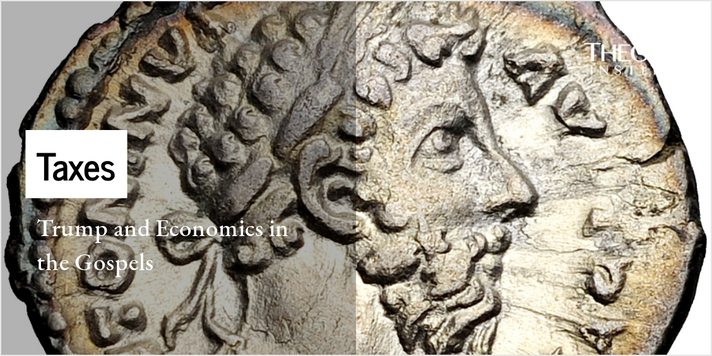 Taxes play an intriguing role throughout the Gospels. References are made to tax booths and a top disciple Matthew was a reviled tax collector. Their frequent mention supports the old adage about them and death. Trump and taxes are famously tied in several ways. There was also a robust system of taxation and government spending in Jesus’ time as we can see from the mention of the census being taken to support tax collection. Luke 2:1 Now in those days a decree went out from Caesar Augustus to register all the empire for taxes. As President, Trump is a fundamental player when it comes to implementing fiscal policy for the entire country. His top legislative accomplishment was a tax overhaul that favored tax breaks for the wealthy and corporations, in search of improved economic growth. A trickle-down sort of supply side policy that was actually showing some results before the pandemic hit. The increased debt resulting from these policies is a byproduct of taxes being lower and spending higher for all kinds of programs including defense. Trump’s tax policies were producing higher and accelerating deficit levels even before the pandemic, which has caused it to explode to previously unimaginable levels. It’s not clear how much debt Rome utilized and there doesn’t seem to be mention of government debt per se. Trump has also used tariffs, and their threat, to cudgel friends and foes alike, most notably China. Tariffs were similarly collected by Roman authorities when goods entered the empire. There are no tax returns mentioned in the Gospels, though tax collecting, and, presumably, their associated records were. Trump’s tax returns are infamous for having never been released and constantly speculated over – with audits and legal suits ongoing. Tribute Tax (2) The tax to Caesar received memorable ink in the Gospels. Luke 23:2 They began to accuse him, saying, “We found this man subverting our nation, forbidding us to pay the tribute tax to Caesar and claiming that he himself is Christ, a king.” Paying Taxes to Caesar Matthew 22:15 Then the Pharisees went out and planned together to entrap him with his own words. 22:16 They sent to him their disciples along with the Herodians, saying, “Teacher, we know that you are truthful, and teach the way of God in accordance with the truth. You do not court anyone’s favor because you show no partiality. 22:17 Tell us then, what do you think? Is it right to pay taxes to Caesar or not?” 22:18 But Jesus realized their evil intentions and said, “Hypocrites! Why are you testing me? 22:19 Show me the coin used for the tax.” So they brought him a denarius. 22:20 Jesus said to them, “Whose image is this, and whose inscription?” 22:21 They replied, “Caesar’s.” He said to them, “Then give to Caesar the things that are Caesar’s, and to God the things that are God’s.” 22:22 Now when they heard this they were stunned, and they left him and went away. Tax (5) There is little objection to taxes in the Gospels – they appear to be an accepted fact of life – just like today. Though there is a reference to them needing to be fair… Luke 3:13 He told them, “Collect no more than you are required to.” And the efficient collection of taxes appears to have inspired census taking. Luke 2:1 Now in those days a decree went out from Caesar Augustus to register all the empire for taxes. Temple Tax / Double Drachma TaxTaxes were collected at the temple. Though it would appear that Jesus might feel he is exempt… Matthew 17:24 After they arrived in Capernaum, the collectors of the temple tax came to Peter and said, “Your teacher pays the double drachma tax, doesn’t he?” 17:25 He said, “Yes.” When Peter came into the house, Jesus spoke to him first, “What do you think, Simon? From whom do earthly kings collect tolls or taxes – from their sons or from foreigners?” 17:26 After he said, “From foreigners,” Jesus said to him, “Then the sons are free. Wouldn’t Trump love that idea? Wouldn’t we all… As we approach the election we thought we would complete this series on Trump and Economics in the Gospels first began in 2017. 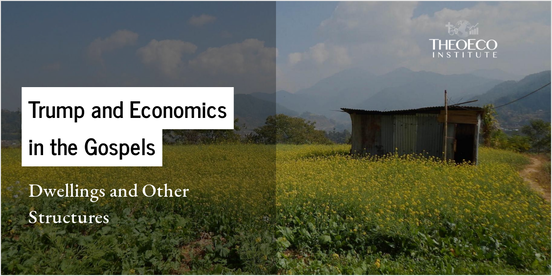 The Gospels are full of houses. They are mentioned seemingly at all times and in all books. The disciples had them. Jesus’ friends had them, as did his enemies. Everyone but Jesus himself seemed to have one. Luke 9:58 Jesus said to him, “Foxes have dens and the birds in the sky have nests, but the Son of Man has no place to lay his head.” One might think Trump would be well represented in these passages given his profession as a builder – and indeed he is! Trump is famous for his dwellings – and achieved much of his wealth through their building. He currently lives in perhaps the most famous house of them all: The White House. Building homes is the family business, though the Trumps have certainly diversified. This particular section of Trump and Economics in the Gospels study seems, therefore, particularly prescient somehow. From an economics standpoint it would seem pretty obvious that homebuilding, like today, was a cornerstone of economic activity in the Roman economy. As is seen in the chapters on labor and produced goods it is also apparent that tools and jobs were abundant in the home building sector, if you will. Lastly, the Gospels never seem to disparage the owner of a home for owning it, as one might expect given the statements that one should sell everything and give to the poor. Houses seem to be exempt. Folks gotta live somewhere after all. In addition to housing, there was a lot of other building going on back in the days of the Gospels. Synagogues, tombs, prisons, barns – there’s quite a list. Perhaps the most famous structures in the Gospels are the manger and inn. Luke 2:7 …and laid him in a manger, because there was no place for them in the inn. One might wonder: Would there be room at a Trump hotel? |
Archives
July 2024
Categories
All
|
TheoEco Institute is a 501(c)(3) nonprofit organization. Contributions to TheoEco in the United States are tax exempt to the extent provided by law.


 RSS Feed
RSS Feed